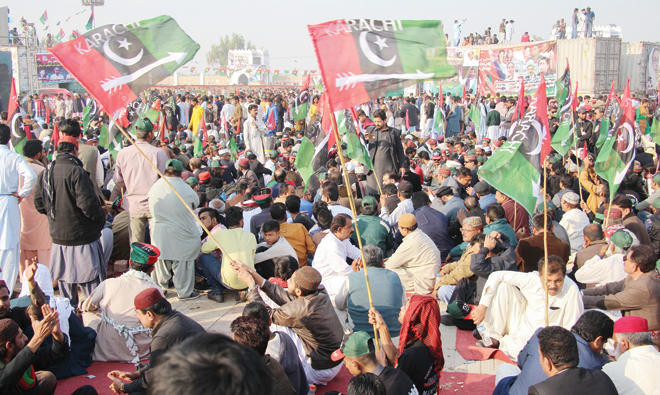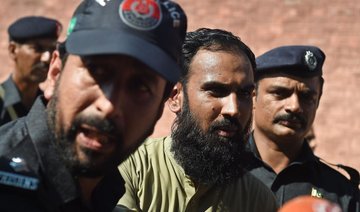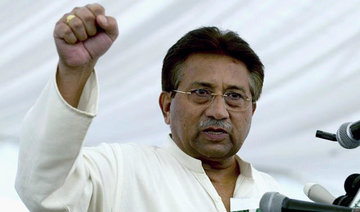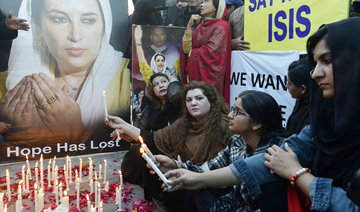KARACHI: Thousands of mourners visited the shrine of former Pakistani prime minister Benazir Bhutto Wednesday as the country marked 10 years since her assassination, with her killers yet to face justice.
An estimated 20,000 people gathered at the shrine in Garhi Khuda Baksh in the Bhutto family stronghold of Sindh province, television images showed.
They came to pay their respects to the charismatic politician, who was the first woman to lead a Muslim country and a darling of the West.
“I feel we have become orphans after her martyrdom,” mourner Allah Varayo, 45, told AFP by telephone from the shrine. Others waved flags in the black, red and green of Bhutto’s Pakistan Peoples Party (PPP) as well as photographs of the slain leader.
“I could see more vigour among the people, who have come in larger numbers than the previous years,” said Ahsan Junejo, a resident of the Bhutto’s home town Larkana near the shrine.
Bhutto, a two-time prime minister, was contesting a third election when she was assassinated in a gun and suicide attack at a rally in Rawalpindi on Dec. 27, 2007.
Her death plunged Pakistan into political uncertainty and street violence and shocked the world.
Former president and military ruler Pervez Musharraf is alleged to have been part of a broad conspiracy to have Bhutto, his political rival, killed before elections.
He has been charged with the murder but has denied the allegation, and remains in self-imposed exile in Dubai. Earlier this year a Pakistani court declared him a “fugitive” in the case.
“Murderer, murderer, Musharraf, murderer!” Bhutto’s son Bilawal, chairman of the PPP, chanted along with the crowd at the shrine Wednesday, an unusual expression of mass defiance against the military.
Musharraf’s government blamed the assassination on Pakistani Taliban chief Baitullah Mehsud, who denied any involvement. He was killed in a US drone attack in 2009.
In 2010 a UN report accused Musharraf’s government of failing to give Bhutto adequate protection and said her death could have been prevented.
To this day just two people have been convicted of the assassination — policemen accused of “mishandling” the crime scene.
Five alleged militants accused of being involved in the killing were cleared earlier this year, though they remain behind bars for now.
The unanswered questions surrounding the assassination have prompted a flood of conspiracy theories.
“There are theories only, and even after 10 years we don’t know who was behind the murder,” Muqtida Mansoor, a political analyst, told AFP.
Pakistan grieves Benazir Bhutto, 10 years after assassination
Pakistan grieves Benazir Bhutto, 10 years after assassination

Venezuela police arrest suspect in TikTok user’s murder
Jesus Sarmiento, who had more than 77,000 followers on the social media platform, was broadcasting live when armed men entered the residence where he was staying and shot him.
Attorney General Tarek William Saab announced Sunday on Instagram the arrest of Pierina Uribarri, whom he described as the partner of Adrian Romero, the alleged gunman.
Prosecutors charged Uribarri with intentional homicide, criminal association and terrorism.
Arrest warrants had been issued for Romero and two other alleged perpetrators, Wilbert Gonzalez and Gerald Nieto.
In Sarmiento’s final broadcast, banging on a door and a woman’s screams for “help” can be heard in the background.
“They shot me, they shot me,” Sarmiento is heard saying before blood appears on the floor. Two armed men are visible before the broadcast ends.
Sarmiento had spoken in his TikTok posts about the leader of the Tren de Aragua gang, Hector Rusthenford Guerrero, who is one of Venezuela’s most wanted criminals, known by the alias “Nino Guerrero.”
He also posted photos and videos of alleged gang members and denounced extortion by police officers.
The government has maintained that the Tren de Aragua — which the United States considers a “terrorist” organization — has already been dismantled and denies its existence.
In May, a young Mexican influencer was murdered during a live stream in Jalisco state.
Judges to decide if UK can supply parts for Israeli warplanes

- The UK government suspended some export licenses for military equipment after concluding there was a risk Israel could be breaching international humanitarian law
LONDON: British judges will rule on Monday on a legal challenge brought by a Palestinian human rights organization seeking to block the UK from supplying components for Israeli F-35 fighter jets.
Israel has used the jets to devastating effect in its bombardment of Gaza, with both sides being accused of atrocities during a conflict that has killed tens of thousands — mostly Palestinian civilians, according to the Hamas-run territory’s health ministry.
The UK government suspended some export licenses for military equipment after concluding there was a risk Israel could be breaching international humanitarian law, but made an exemption for some parts for Lockheed Martin F-35 stealth jets.
In its claim to the High Court, rights group Al-Haq said the “carve out” was unlawful, alleging the government had misunderstood the applicable rules of international law — a claim denied by ministers.
The UK contributes components to an international defense program that produces and maintains the F-35s.
Defense Secretary John Healey said a suspension would impact the “whole F-35 program” and have a “profound impact on international peace and security.”
The London court is due to give its ruling at 0930 GMT.
Al-Haq, which is supported by Amnesty International, Human Rights Watch, Oxfam and others in its case, is seeking a court order to stop the supply of UK-made parts for the US warplanes.
Lawyers for Al-Haq said the government had known there was a “clear risk” Israel would use the jet parts to commit violations of international law.
But government lawyer James Eadie said the UK’s trade department had acted lawfully.
He added the court was not placed to rule on the legality of Israel’s actions, and that attempting to do so could have a “potentially deleterious” effect on “foreign relations with a friendly state, namely Israel.”
In September 2024, the new Labour government announced it was suspending around 30 of 350 export licenses following a review of Israel’s compliance with international humanitarian law.
But the partial ban did not cover British-made F-35 parts, which include refueling probes, laser targeting systems, tires and ejector seats, according to Oxfam.
Healey has previously said suspending F-35 licenses would “undermine US confidence in the UK and NATO” but lawyers for Al-Haq have described the exemption as a “loophole.”
UK-based NGO Campaign Against Arms Trade has said that licensing figures showed the government had made a “shocking increase in military exports to Israel” in the months after its September 2024 announcement of partial suspensions.
It said the figures showed the UK approved £127.6 million ($170 million) in military equipment to Israel in single-issue licenses from October to December 2024, saying this was more than for the period from 2020 to 2023 combined.
Most of the licenses were for military radars, components and software, as well as targeting equipment, according to the NGO, which was involved in the case against the government.
Azerbaijan cancels Russian events over the deaths of Azerbaijanis in Yekaterinburg

- According to Azerbaijan’s Foreign Ministry, Russian law enforcement raided homes of Azerbaijani residents in the industrial city in Russia’s Ural Mountains on Friday
- The Azerbaijani government also announced the cancelation of a planned visit by Russian Deputy Prime Minister Alexey Overchuk
Azerbaijan has canceled all cultural events planned by Russian state and private institutions in protest over the deaths of two Azerbaijanis after police raids in the Russian city of Yekaterinburg, Azerbaijani officials said Sunday.
Azerbaijan’s Culture Ministry wrote on X that concerts, exhibitions, festivals and performances were canceled on account of “the demonstrative targeted and extrajudicial killings and acts of violence committed by Russian law enforcement agencies against Azerbaijanis on ethnic grounds in Yekaterinburg.”
According to Azerbaijan’s Foreign Ministry, Russian law enforcement raided homes of Azerbaijani residents in the industrial city in Russia’s Ural Mountains on Friday. Two Azerbaijanis were killed, it said, along with several others seriously injured and nine detained.
The ministry on Saturday summoned the Russian Embassy’s chargé d’affaires in Baku, Pyotr Volokovykh, demanding a full investigation and prosecution of those responsible.
The victims were identified as Ziyaddin and Huseyn Safarov, both around 60 years old. Their brother, Sayfaddin Huseynli, told Azerbaijani public broadcaster ITV that the men were tortured to death “without any trial or investigation, despite their innocence.” He described the raids as “savagery,” claiming that others were beaten and subjected to electric shocks.
“The so-called Russian law enforcement agencies broke into houses in the middle of the night, beat and took people away like animals,” Huseynli said.
The Azerbaijani government also announced the cancelation of a planned visit by Russian Deputy Prime Minister Alexey Overchuk. “The government of Azerbaijan does not consider it appropriate under the current circumstances for Overchuk or any other official representative of Russia to visit the country,” state media reported.
In a statement, Azerbaijan’s Foreign Ministry said it expected “that the matter will be investigated and all perpetrators of violence brought to justice as soon as possible.”
Without commenting on the reported deaths, Russian Foreign Ministry spokeswoman Maria Zakharova said Saturday that the raids formed part of an investigation into previously committed crimes. Zakharova said raids and detentions targeted Russian citizens of Azerbaijani descent.
Ties between the two countries have been strained for months. Azerbaijani President Ilham Aliyev declined an invitation to attend Russia’s Victory Day parade in Moscow in May. In contrast, Ukraine’s Foreign Minister Andrii Sybiha visited Baku later that month, signaling closer ties between Baku and Kyiv.
Relations between Moscow and Baku cooled after an Azerbaijani airliner crashed in Kazakhstan in December, killing 38 of 67 people aboard. Aliyev said it was shot down over Russia, albeit unintentionally, and rendered uncontrollable by electronic warfare. He accused Russia of trying to “hush up” the incident for several days. Putin apologized to Aliyev for what he called a “tragic incident” but stopped short of acknowledging responsibility.
German FM visits Kyiv, pledges continued support for Ukraine

- Germany has been Ukraine’s second-largest military backer after the United States
KYIV: German Foreign Minister Johann Wadephul made an unannounced visit to Kyiv on Monday, in a show of continuing support for Ukraine’s fight to repel Russia’s invasion as US-led international peace efforts fail to make progress.
Wadephul was due to meet with Ukraine President Volodymyr Zelensky and Ukrainian Foreign Minister Andrii Sybiha.
Wadephul said in a statement that Germany will help Ukraine “continue to defend itself successfully — with modern air defense and other weapons, with humanitarian and economic aid.”
Germany has been Ukraine’s second-largest military backer after the United States, whose continuing support is in doubt.
However, Berlin has balked at granting Zelensky’s request to provide Ukraine with powerful German- and Swedish-made Taurus long-range missiles. That’s due to fears that such a move could enrage the Kremlin and end up drawing NATO into Europe’s biggest conflict since World War II.
Instead, German Chancellor Friedrich Merz pledged in May to help Ukraine develop its own long-range missile systems that would be free of any Western-imposed limitations on their use and targets.
Wadephul was accompanied on his trip to Kyiv by German defense industry representatives.
Russia’s invasion shows no sign of letting up. Its grinding war of attrition along the roughly 1,000-kilometer (620-mile) front line and long-range strikes on civilian areas of Ukraine have killed thousands of troops and civilians.
The Russian effort to capture more Ukrainian territory has been costly in terms of casualties and damaged armor. But Russian President Vladimir Putin has effectively rejected a ceasefire and hasn’t budged from his war goals.
Putin “doesn’t want negotiations, but (Ukrainian) capitulation,” Wadephul said in his statement.
Russia launched its biggest combined aerial attack against Ukraine at the weekend, Ukrainian officials said, in its escalating bombing campaign that has further dashed hopes for a breakthrough in peace efforts.
UN conference seeks boost for aid as US cuts bite

- UN sustainable development goals set for 2030 are slipping from reach just as the world’s wealthiest countries are withdrawing funding for development programs
SEVILLE: A UN conference aiming to rally fresh support for development aid began in Spain on Monday with the sector in crisis as US-led funding cuts jeopardize the fight against poverty.
At least 50 world leaders including French President Emmanuel Macron, Kenya’s William Ruto, EU chief Ursula von der Leyen and UN head Antonio Guterres are gathering in the city of Seville for the June 30-July 3 meeting.
Senegalese President Bassirou Diomaye Faye, Ecuador’s Daniel Noboa, Angolan leader Joao Lourenco and Sudanese army chief Abdel Fattah Al-Burhan also joined more than 4,000 delegates from businesses, civil society and financial institutions.
But the United States is snubbing the biggest such talks in a decade, underlining the erosion of international cooperation on combating hunger, disease and climate change.
A blistering heatwave that is scorching southern Europe welcomed the delegates to the Fourth International Conference on Financing for Development, an example of the extreme weather that scientists say human-driven climate change is fueling.
UN sustainable development goals set for 2030 are slipping from reach just as the world’s wealthiest countries are withdrawing funding for development programs.
US President Donald Trump’s gutting of his country’s development agency USAID is the standout example, but Germany, Britain and France are also making cuts as they boost spending in areas such as defense.
International charity Oxfam says the cuts to development aid are the largest since 1960 and the United Nations puts the growing gap in annual development finance at $4 trillion.
More than 800 million people live on less than $3 a day, according to the World Bank, with rising extreme poverty affecting sub-Saharan Africa in particular.
Disruption to global trade from Trump’s tariffs and ongoing conflicts in the Middle East and Ukraine have dealt further blows to the diplomatic cohesion necessary for concentrating efforts on helping countries escape poverty.
Among the key topics up for discussion is reforming international finance to help poorer countries shrug off a growing debt burden that inhibits their capacity to achieve progress in health and education.
The total external debt of the group of least developed countries has more than tripled in 15 years, according to UN data.
Critics have singled out US-based bulwarks of the post-World War II international financial system, the World Bank and the International Monetary Fund, for reform to improve their representation of the Global South.
Painstaking talks in New York in June produced a common declaration to be adopted in Seville that only went ahead after the United States walked out.
The document reaffirms commitment to the UN development goals such as eliminating poverty and hunger, promoting gender equality, reforming tax systems and international financial institutions.
The text also calls on development banks to triple their lending capacity, urges lenders to ensure predictable finance for essential social spending and for more cooperation against tax evasion.
Coalitions of countries will seek to spearhead initiatives in addition to the so-called “Seville Commitment,” which is not legally binding.
But campaigners have criticized the text for lacking ambition and have rung alarm bells about rising global inequality.
“Global development is desperately failing because... the interests of a very wealthy few are put over those of everyone else,” said Amitabh Behar, executive director of Oxfam International.
Hundreds of demonstrators braved the sizzling heat in Seville on Sunday to demand change in international tax, debt and aid policies.
“Global south countries will never be able to decide how they want to do development if they are bound to the new colonial debt,” protester Ilan Henzler, 28, told AFP.
“We are here to fight for the abolition of this illegitimate debt.”



















